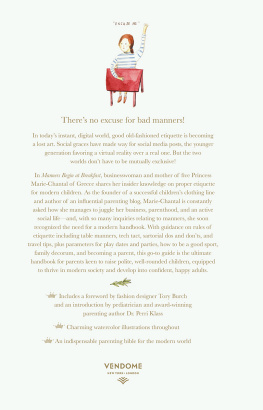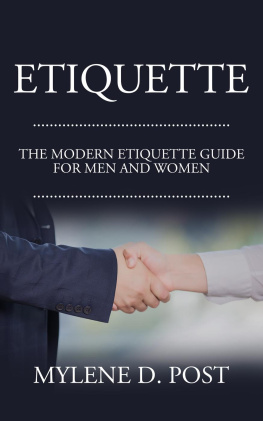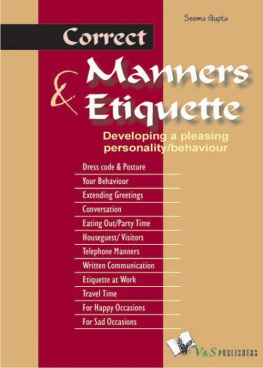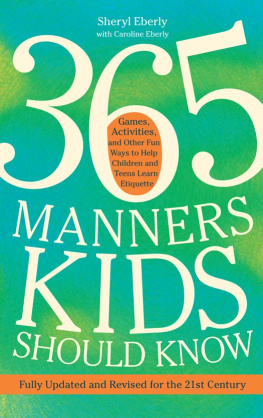Contents
Guide
Page List




Contents
by Tory Burch
by Dr. Perri Klass

Tory Burch
I am delighted to introduce Manners Begin at Breakfast.
When Marie-Chantal mentioned she was writing a book about raising well-behaved children, my first thought was: perfect timing Parents today face a unique set of issuesfrom iPhone etiquette to social media appropriateness and beyond. Its a new frontier. And there is no one better to weigh in than Marie-Chantal, a successful entrepreneur, and one of the best mothers I know.
Since the day we met, I have seen Marie-Chantal effortlessly navigate being an excellent mother and savvy businesswoman in both New York and London, all the while making sure her children developed into fantastic young adults with poise, personality, andof courseimpeccable manners. Even more than that, they reflect the rare values of their mom: character, integrity, and grace. She is clearly doing something right.


I first met Marie-Chantal in New York in the 1990s. As our friendship grew, I realized we had much in common, from our love of family to being working moms to understanding that raising children is a constant work in progress. My father had a wonderful expression that being a gentleman is not a part-time jobsomething I have often said to my boys. It is something Marie-Chantal also subscribes tothat manners should be a given.
I have always been a big believer in practicing what you preach, and Marie-Chantal is doing just that. Her elegance and strength is something we all can aspire to and I know there are invaluable lessons to be learned with her guidance.
This book is a modern blueprint to show you the way.
Tory Burch
Dr. Perri Klass
The two most important jobs for all parents are keeping their children safe and teaching them how to behave. This is true everywhere, in all social circles and in all countries, and always has been. When children are young, both jobs start out focused inside the family, with the parents at least partly in control; you keep a young child safe with specially designed car seats, safe sleep surfaces, age-appropriate toys, and a child-proofed house. But as the child gets older, safety becomes more and more about helping that child learn the skills to navigate out in the big wide world.
Similarly, you start out managing your childs behavior by patiently issuing regular reminders to say please and thank you, your goal being a child who will grow up reliably able to deal with everyday situations involving other peoplefrom meeting or dining with them, to attending a variety of events with them, to (eventually) working with them. And, as a parent, just as you wish for your children to be equipped to make good, sensible, safe decisions, you also want them treating other people with care, courtesy, and consideration.

These two imperatives are also at the core of my own profession, pediatrics. Its our job as pediatricians to help you, as parents, to keep kids safe and healthy, and also to help you nurture their development and understanding. And, since small children are always learning, every breakfast and every bedtime is a parental opportunity for teaching and for modeling, and a chance for children to practice new skills, from the fine motor function you need to manage your food to the art of making interesting conversationand taking turns so that you hear what other people have to say too.
Manners matter
As a parent, helping your child to grow up learning good manners is probably your most important job after helping them to grow up safely and in good health. This is how you help your child learn about relationshipswith family members and close friends, and with strangers. You cannot (and should not) hope to teach a lesson like, Always love your brother. Frankly, life is complicated and families are intense, and your innermost feelings are your innermost feelings, and they arent anyone elses business, as long as you keep them on the inside.
It is, however, completely reasonable for parents to set out the expectation that children will treat family members with basic courtesy. In other words, you cannot (and should not) enforce a rule like, You may never hate your brother, not even for a minute. The rule we can enforce is, You may never hit your brother, no matter how much you think he deserves it. (All of us with brothersor sisterswill know that feeling!) You arent trying to make rules about what your children think and feelyoure making rules about how they behave.
And the remarkable thing about learning good manners is that how you behave affects how you think and how you feel. A child who treats a brotheror grandmother, or any other family memberwith consistent courtesy is going to have a better chance of developing genuinely fond feelings for that person, and of creating some happy memories together. Parents who focus on helping their children to learn how to behave are actually helping them to learn to manage their emotions, organize their thinking, and arrange the details of their lives.

Families matter
This book emphasizes the importance of family time, in a world in which (as all pediatricians and parents know) it is becoming endangered. It takes care and planning, nowadays, to make sure that family members regularly sit face-to-face around a table, and to carve out the time and space for building the habits, rituals, and silly family jokes that make up precious memories. Some of the suggestions in this book are about manners and traditions that have been around for a long time, but the book is also about putting these suggestions into practice in the world we live in today, being careful and conscious, for example, of how we all handle the many electronic distractions always ready to lure our attention away from the real people around us.
As a pediatrician, I try hard to give families good advice relating to the use of electronics and screen time, starting when children are very young (when, essentially, there should be no screen time at all, except for the occasional Skype call, or similar, with a distant family member). This is a way of sayingover and overthat what matters most with young children is real human contact and conversation; thats how they learn and how their brains grow. As kids approach adolescence, their health may be affected in many ways by their relationship with their phones, touching everything from whether they get enough sleep to how they feel about their friends. The question of when we do and dont look at our phones may begin as a matter of manners, but it expands out to affect our general health and well-being.

















